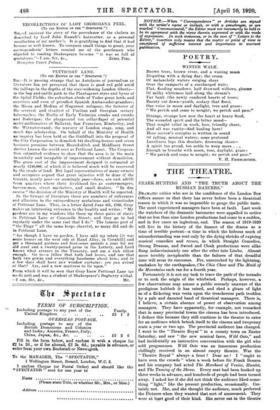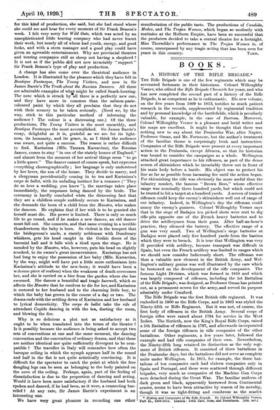THE THEATRE.
SNARE-HUNTING AND " THE TRUTH ABOUT THE RUSSIAN DANCERS."
DRAMATIC critics who are in the confidence of the London Box Offices assure us that there has never before been a theatrical season in which it was so impossible to gauge the public taste. The most experienced managers have been at fault. Last week the watchers of the dramatic barometer were appalled to notice that no less than nine London productions had come to a sudden, and in five cases an inglorious, end. The season of 1919-1920 will live in the history of the finance of the drama as a time of terrible portent—a time in which the hideous murk of misunderstanding was rent only by the dying shrieks of expiring musical comedies and revues, in which Straight Comedies, Strong Dramas, and Sword and Cloak productions were alike flung indiscriminately one after the other into Limbo. Almost more terribly inekplicable than the failures of that dreadful time will seem its successes. For, unscorched by the lightning, unshaken by the earthquakes, Chu Chin Chow and The Maid of the Mountains each ran for a fourth year.
Fortunately it is not my task to trace the path* of the tornado or to seek the origin of the whirlwind. Perhaps, however, a few observations may amuse a public serenely unaware of the prodigious hubbub it has raised, and shed a gleam of light as of a dickering wax vests upon the treacherous path trodden by a pale and daunted band of theatrical managers. There is, I believe, a certain absence of power of observation among managers. They have apparently, for example, not remarked that in many provincial towns the cinema has been introduced. I deduce this because they still continue in the theatre to cater for an audience which betook itself to the cinema and twopenny seats a year or two ago. The provincial audience has changed. I went to the " Theatre Royal " in a county town on Easter Saturday, and saw " the new musical farce, Wild Oats," and had incidentally an instructive conversation with the girl who sold programmes. Wild Oats was an innocuous production chillingly received in an almost empty theatre. Was the " Theatre Royal " always a frost ? Dear no ! I " ought to have seen the crowds " when a week before Sir Frank Benson and his company had acted The Merchant of Venice, Hamlet, and The Taming of the Shrew. Every seat had been booked up three weeks in advance, and hundreds of people had been turned away. I asked her if she did not think the audience liked some- thing " light," like the present production, occasionally. Cer- tainly not. She, and she thought the audience, much preferred the Pictures when they wanted that sort of amusement. They were at least good of their kind. She never sat in the theatre
for this kind of production, she said, but she had stood where she could see and hear for every moment of Sir Frank Benson's week. I felt very sorry for Wild Oats, which was acted by an unsophisticated little touring company who had never learnt their work, but nearly all of whom had youth, energy, and good looks, and with a stern manager and a good play could have given an agreeable entertainment. Why are provincial theatres and touring companies still as sheep not having a shepherd ? It is not as if the public did not now invariably " support " Sir Frank Benson's type of play and production.
A change has also come over the theatrical audience in London. It is illustrated by the pleasure which they have felt in Boutique Fantasque, The Young Visiters, and now in Sir James Barrie's The Truth about the Russian Dancers. All three are admirable examples of what might be called Snark-hunting. The note which is struck by all three is a perfectly new one, and they have more in common than the salmon-paste- coloured paint by which they all proclaim that they do not wish their scenery to be taken seriously. (Need we, by the way, stick to this particular method of informing the audience ? The colour is a distressing one.) Of the three productions, The Young Visiters is the most unearthly, and Boutique Fanta,sque the most accomplished. Sir James Barrie's essay, delightful as it is, grateful as we are for its light- ness, its humanity, and its grace, is, as I think the audience was aware, not quite a success. The reason is rather difficult to find. Karissima (Mlle. Tamara Karsavina), the Russian dancer, comes to stay " in one of the stately homes of England," and almost from the moment of her arrival things seem " to go a little queer." The dancer cannot of course speak, but expresses everything choreographically ; her language is only understood by her lover, the son of the house. They decide to marry, and a clergyman providentially coming in to tea and Karissima's corps de ballet, with its unfailing instinct for a romance (" They do so love a wedding, you know "), the marriage takes place immediately, the responses being danced by the bride. The ceremony is hardly concluded when the distressing fact that they are a childless couple suddenly occurs to Karissima, and she demands the boon of a child from the Maestro, who makes the dancers. He explains that if her wish is to be granted she herself must die. His power is limited. There is only so much life to go round, and if he makes a new dancer, an old dancer must fall out. She consents, and that same evening in a terrible thunderstorm the baby is born. So violent is the tempest that the bridegroom's uncle, a stately nobleman with Dundreary whiskers, gets his head caught in the Gothic doors of the baronial hall and it falls with a thud upon the stage. He is mended by the Maestro, who, however, puts his head on slightly crooked, to its owner's great inconvenience. Karissinla has not had long to enjoy the possession of her baby (Mlle. Karsavina, by the way, might well have put a little more enthusiasm into Karissima's attitude to the new-born; it would have beeri a welcome piece of realism) when the weakness of death overcomes her, and she is carried on a bier from the garden where she has swooned. She dances a beautiful and tragic farewell, which so affects the Maestro that he resolves to die for her, and Karissima is restored to her husband and to the charming little boy, to which the baby has grown in the course of a day or two. The drama ends with the settling down of Karissima and her husband to lyrical domesticity. The corps de ballet take the role of attendant Cupids dancing in with the tea, dusting the room, and blowing the fire.
Why is so delicious a plot not as satisfactory as it ought to be when translated into the terms of the theatre ? Is it possibly because the audience is being asked to accept two sets of conventions at one and the same moment, the dancing convention and the convention of ordinary drama, and that these are neither identical nor quite sufficiently divergent to be com- patible ? The traveller in Italy will remember how often the baroque ceiling in which the nymph appears half in the round and half in the flat is not quite artistically convincing. It is difficult for the spectator to catch the point at which the free dangling legs can be seen as belonging to the body painted on the cove of the ceiling. Perhaps, again, part of the feeling of dissatisfaction is due to the proportion of dancing and acting. Would it have been more satisfactory if the husband had both spoken and danced, if he had been, as it were, a connecting bas- relief ? At any rate, Sir James Barrie's experiment is an interesting one. We have very great pleasure in recording one other
manifestation of the public taste. The productions of Candida, Medea, and The Trojan Women, which began so modestly with matinees at the Holborn Empire, have been so successful that the produtiers decided to take a central theatre for a fortnight. Miss Thorndike's performance in The Trojan Women is, of course, unsurpassed by any tragic acting that has been seen for



































 Previous page
Previous page